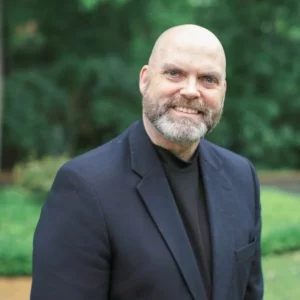Is it just me, or are we all just plain worn out? Most of us who are working from home are discovering (as my friend, Jorge Acevedo says) parts of our brain we haven’t used in years, or maybe ever. Sort of like discovering muscles when we exercise that we didn’t even know we had. We’re having to connect facts differently, and we’re all having to innovate.
Pastors are having to figure out things on the fly that we’ve never considered before. Every pastor worth their salt wants to see their community fall forward, but the sheer barrage of new challenges, shifting facts, new ideas … well, it can be exhausting. This week, I realized I needed something deeper than, “hey! that’s cool!” as a barometer for how I vet the plethora of decisions facing us daily. Through prayer, I developed a few thoughts that can become for us a decision-making filter as we move forward. I’ve shared these thoughts with our vision and staff teams.
My guiding principle is this: Let the Gospel lead. It is the gospel, not culture, that must take the lead in forming our choices and changes. Under that banner, I’ve shaped six filters to help us stay in our theological lane as we make wise choices for your community:
1. Holy conferencing is how Christians connect. This is a distinctly Methodist term for the way we pursue discipleship in community. Andrew Thompson writes that holy (or Christian) conferencing is “about believers coming together to focus on their faith: to pray, to share their experience of God, to seek advice and to offer counsel, and even to confess their sins and ask for forgiveness” (Means of Grace, p. 90). This odd time we are in opens up a real opportunity to emphasize holy conferencing both in the home and in discipling groups. In crisis times, we certainly want folks to sense they are remembered, treasured and connected and care plans that make sure everyone gets a call are useful. But group life should always be the front line of pastoral care and spiritual formation. Teaching families how to care for each other spiritually in the home and encouraging folks toward online groups are both ways we can practice healthy community. Are we developing and emphasizing spiritual formation systems that will hold us for the long haul (and that don’t foster the dis-eases of individualism and consumerism)?
2. Prophetic presence is our worship posture. Our work is to authentically proclaim the good news about Jesus Christ. I believe the Church of Jesus Christ will benefit from our collective shift to an online presence. That move should be permanent. But the temptation in that realm is to work harder at the presentation than the content. And those without the appropriate theological grounding will tempt us toward unholy fire as we try to appease everyone’s individual tastes. As we innovate online worship services, our emphasis must always be connecting people with the Presence, power, and truth of God. Are we sowing DNA into our online worship that emphasizes presence over performance?
3. Prayer is the work. This season has given us all the great gift of a unified cry: God, have mercy and heal your land! The season is ripe for calling people to pray, and for teaching them how to cry out. Prayer is how we join the armies of angels who are right now doing battle with the powers and principalities on our behalf. It is also how we become sensitized to the will of God, and encouraged and strengthened to live it out. I’m praying daily for doctors and researchers and legislators who can bring this crisis to an end, but I’m under no illusions that they hold the power. Nope. The real power is in the prayers of God’s people. Are we using this moment to teach families how to pray together for more than a blessing over meals? Are we modeling for our people a holy hunger for the work of prayer as a way of deepening faith, and broadening our understanding of the character and will of God?
4. Holiness is practical, but not necessarily pragmatic. Holiness is always useful, which is to say that it actually works in real life. Holiness is practical; it will always meet the moment, but it will not be dumbed down. This is why we must be careful in our reverence for things like holy communion — not becoming so pragmatic in our approach that we “eat or drink judgment.” Decisions about worship, sacraments, and even the ways we share our needs should always be filtered through the lens of holiness, with the long view in mind. Are we designing our spiritual practices so that they expose us most fully to the heart of a good, loving and creative God … and so that we don’t feed the “cool factor” at the expense of deeper pursuits?
5. Wisdom moves at the rate of the Gospel. Let me say that more plainly: Every idea you see on social media isn’t an idea your church has to do in order to be relevant. Oh, how I wish I’d learned this lesson early on in my days as a church planter. When I was desperate to keep a fledgling church alive, I followed too many shiny objects down dead-end streets when I should have been discerning the Holy Spirit’s leading for my unique community. I feel the tug toward those old tendencies in this current crisis, but I’m trying to remember lessons learned (side note: someone has said that forgetting can be its own kind of idolatry. Amen all by myself). I would rather move slowly, with reverence toward the gospel, than rush ahead to do as others have done. In every decision, are we allowing the gospel — not finances or fear — to lead?
5. Life matters. Jesus taught that good shepherds are bold in their risk-taking. They’ll walk away from a whole flock to care for one sheep that has wandered off. These days, we are trusting that truth as we delay community worship for the sake of those who could become fatally ill by our large gatherings. This is not to say, however, that we are “forsaking the assembly” (see #1 above). To the contrary, this is our time to flex other parts of our corporate brain — to emphasize spiritual formation in smaller units. To emphasize the family altar and the development of small-group discipleship as vital to sanctification. I also believe there is great potential in this season to go after those who might not walk into a church building, but who might have comfort and curiosity enough to find us online. And I also believe this moment can call our country to consider life without churches … without worship … without Christian witness. This Spirit-led life is life in all its fullness. I am praying for a holy hunger to develop for the things of God in this season while we fast from meeting together in large gatherings because yes, physical life is precious, but eternal life is the real treasure. Are we using this time to do more than simply keep everyone physically healthy and emotionally heard? Are we emphasizing spiritual health and growth for each person in our care?
If you have the humbling privilege of spiritual leadership in this season, may these thoughts help you to root your decisions more deeply in Kingdom soil. And remember: while we haven’t ever been here before, God has. He has seen this world through wars, famines, plagues, floods and other desolations. He knows what creation is made of and This God Who Knows can be trusted to walk us through this into a future that still holds hope.








